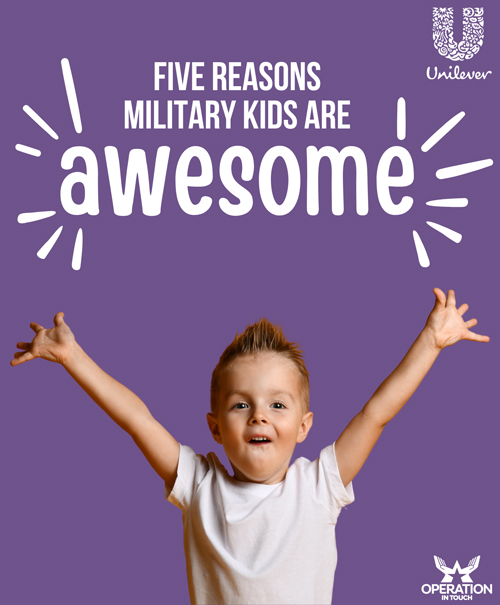
5 Reasons Why Military Kids Are Awesome
When I was growing up I had it pretty easy. From toddlerhood until I graduated high school, I lived in the same familiar family home, attended the same school system, and even made lifelong friends. Sure I experienced my own set of childhood challenges. Most kids do. But for me, the stability was there.
Now as a military wife and mom, I often think about how military life will provide my son with a strikingly different childhood experience. Military kids move multiple times, live in places all over the world, see friends come and go, and often have a military parent gone on and off for work. In general, military kids face a unique set of experiences that mold and shape them into adult life.
As we celebrate the month of the military child, let’s explore a few reasons military kids are incredibly awesome:
Adaptability to new places and faces.
Military kids move an average of 10 times while growing up. 10 times! That’s a huge amount even for an adult to manage. With the ever-present mobile lifestyle, military kids adapt both to new environments and new people, and they do so with each move to a new military base, town or country.
Appreciation of diversity.
Whether living stateside or abroad, military kids are exposed to a variety of cultural situations in which new customs and language are learned. Even moving from the South to the Midwest within the US offers a reasonable amount of changes for a child. Living overseas, many kids learn a second language in addition to an entirely new culture and way of life.
Enhanced social skills.
Military kids learn how to make new friends over and over again. For military kids, social groups that existed one year cease to exist the next. A typical military school can experience up to a 50 percent turnover each year. That’s a startling amount.
Military kids learn to say goodbye and keep in touch, while also embracing new friendships with each move. Knowing all too well what it is like to be a new student, military kids are more likely to reach out to new students, jump right in and be sociable.
Resiliency in challenging situations.
Given a loving home with well-embraced coping skills, military kids are often resilient in the face of frequent deployments, moves, and life changes. With the help of modern technology, kids discover unique ways to stay in contact with military parents in other parts of the world.
There is a flip side to modern technology, though. Kids now have access to fast-paced news channels and websites reporting on troops in combat zones. These are difficult subjects for children to learn and understand. While most parents protect their children the best they can, many military kids are still exposed to this information. Through it all, military kids gain resiliency towards these challenging situations.
Desire to serve others.
In childhood, military kids may take a new kid at school under their wing or become accustomed to helping other military families experiencing a challenging time. They may reach out and invite friends over for a sleepover or dinner at their house or simply offer a hug to another child. Through small gestures, military kids help each other.
In addition, studies show that military kids frequently end up pursuing service-related careers after entering into adult life. More often than civilian children, many military kids seek out military service, teaching, counseling, police, nursing and Foreign Service work as careers.
Wrapping it up.
Military kids help us all see the bright side of military life, with even the youngest military child demonstrating resiliency in the face of adversity. It’s a welcome breath of fresh air, and these wonderful children will become the next generation of this country, leading us all towards adaptability, appreciation of diversity, resiliency, and the desire to serve others.
Lauren Tamm is a mother, military spouse, freelance writer, and coffee lover. When she isn’t busy chasing a toddler around the house, she loves to blog about practical parenting, enjoying motherhood and navigating military life.


